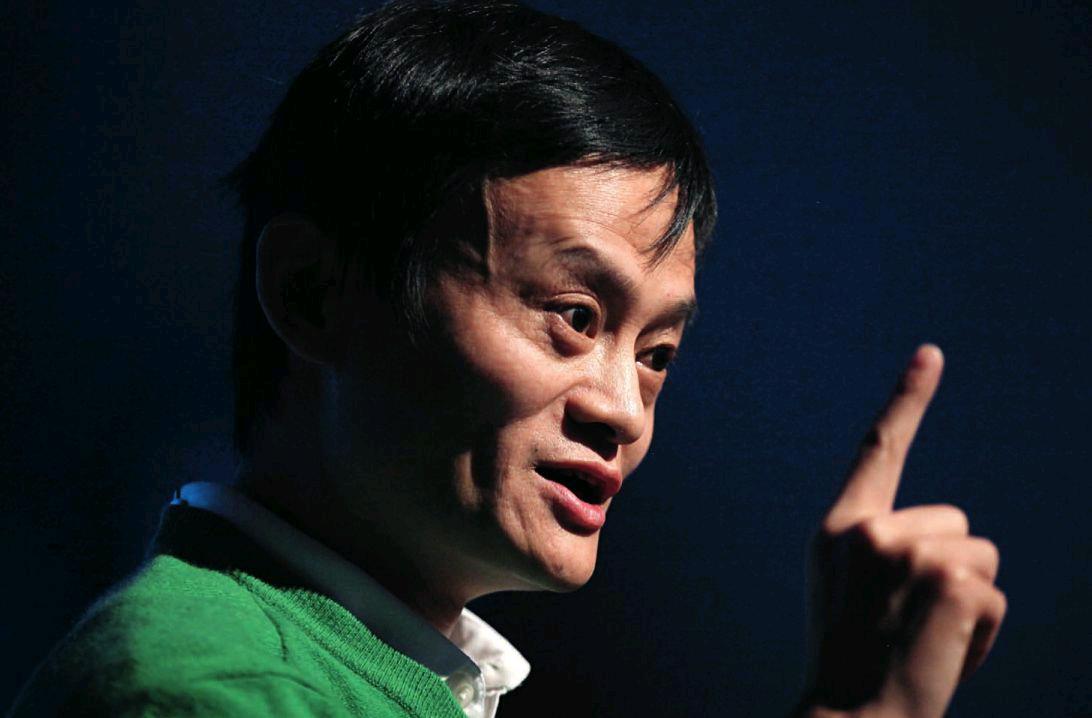Ma Yun’s Internet World
By+staff+reporter+ZHU+HONG
AS the founder and chair- man of Alibaba Group, every one of Ma Yuns business decisions attracts attention. From spending RMB 1.2 billion on stakes in the Guangzhou Evergrande Football Club to wholly acquiring UCWeb, and to making the Initial Public Offering (IPO) in the U.S., Ma Yun continues to make headlines with many fingers in many pies, despite having resigned as Alibabas CEO.
Alibaba, Chinas largest e-commerce enterprise, boasts hundreds of millions of users and provides business platforms for millions of online shops, taking up 80 percent of Chinas online shopping market share. The companys two websites Taobao and Tmall registered a sales volume of US $240 billion in 2013, three times that of eBay and twice Amazon. In 2013, Alipay, the companys smartphone-based payment platform, had a turnover more than three times that of U.S. rival PayPal.
“Fifteen years ago, Alibabas 18 Chinese founders were determined to establish a world-class Internet company. Fifteen years later, our company is more successful than we could ever imagine. Alibaba is entering an age of new challenges,” Ma Yun wrote in an email to Alibabas employees, before the company applied for its first U.S. IPO.
Father of the Chinese Internet
In a way, Ma Yuns entrepreneurship parallels the history of Chinas Internet.
In 1995, as an interpreter for a Chinese trade delegation to the U.S., Ma Yun encountered the Internet for the first time. “This is Internet, you can search anything by inputting key words,”said a local friend whose advice intro-duced Ma to the new world. Mas first search was for “beer” and returned huge amounts of information about German and American beer. Then he searched for “China,” but the response was “no data.” Ma wondered why there was nothing about China on the Internet. Thinking fast, he persuaded a friend to make a website for an English-Chinese translation service. Within three hours he received six emails requesting information, giving Ma his first glimpse of the Internet as a business opportunity.
After returning home, Ma set up Chinas first business website – China Yellow Pages, which made homepages for other enterprises. Each homepage contained about 2,000 characters in both Chinese and English and a color picture, and cost RMB 20,000.
Invited by the Ministry of Foreign Trade and Economic Cooperation(MOFTEC) in 1997, Ma Yuns team joined the China International Electronic Commerce Center. Within a year they successively developed a number of websites for customers including several government ministries and commissions.endprint
Ma left MOFTEC in early 1999 and established Alibaba in his apartment in Hangzhou. “If the business world is also divided into the poor and the rich, the Internet is for the poor,” said Ma. “I want to lead poor people to launch this revolution.” Born in Zhejiang, a province known for well-developed private small and medium-sized enterprises (SME), Ma has struggled with the market, and knows how hard it is to start a small business. “For instance, suppose the manufacturers price for a pen is US $15, but Wal-Mart offers a price of US $8. Since an order could be worth US $10 million, the supplier has to accept the order. However, if Wal-Mart cancels the order next year, the supplier is finished. Fortunately, small suppliers can now use the Internet to find other customers worldwide,” Ma explained.
Alibabas business model is to gather import and export information for small businesses across the world, helping them to find buyers who were otherwise only present at trade fairs. “SMEs are like scattered pebbles on beach, which the Internet can stick together. Com- bined, these small pebbles are mightier than boulders,” said Ma. “Online business is like throwing a sprat to catch a herring, winning competition with speed.”
Original B2B Mode
As a pioneer of Chinas Internet, Ma Yun is also an unconventional innovator in the industry. Though knowing little about Internet technology, he boldly created a distinctive Internet business. Before him there were no success stories in the global business-to-business market and no Chinese Internet company able to create a business model.
Alibabas B2B (business-to-business) model is to provide services like information, finance, management, talent and logistics to SMEs. Unlike other models popular in the West that focus on large enterprises, Alibaba favors small entrepreneurs, matching millions of buyers and sellers worldwide without geographic restrictions. Since the Internet was not yet prevalent in China, there were no competitors.
In May 2003, Alibaba launched its personal e-commerce website – Taobao. In order to compete with eBay, a strong opponent, Taobao adopted a free pattern combined with functions and services tailored to Chinese users. As a result, eBay was forced to withdraw from the Chinese market. Data from analysis company Alexa shows that Taobao has become one of the top 20 most frequently visited websites in the world. endprint
endprint
As Taobao developed, the question of payment security became more problematic, hampering its further development.In December 2004, Alipay, a third-party payment platform which provides a fund supervision service between buyers and sellers, came into operation. Alipay has become Chinas largest third-party payment platform, with 600 million users and daily transactions of over RMB 2.6 billion.
Currently, Alibaba trades more than eBay and Amazon combined, accounting for two percent of Chinas GDP. Alibaba commerce generates 70 percent of Chinas express delivery shipments and takes up 80 percent of the countrys online transactions. Perhaps this is just a beginning, as more than half of Chinas sales are still offline. China now has more than 600 million netizens, which will soon help Chinas e-commerce market surpass the U.S. and become the largest in the world. According to its IPO document, Alibabas net profits in 2013 were US $3.592 billion, second only to Google among global Internet enterprises.
Ma Yuns Commercial Empire
“Just as the Internet is changing the retail industry, we believe it will finally change information-driven industries, such as finance, education, and health care. Once it happens and once we achieve comprehensive interconnection, I believe that equality and transparency, the core Internet spirits, will help China to leap towards a more powerful system and social infrastructure,” Ma Yun said. Ma believes that the Internet is not just about technologies and industries, but conveys a spirit.
Alibabas commercial empire has already expanded beyond e-commerce to more traditional industries. Taking advantage of the mobile Internet, Alibaba has invested in social networks and social media, such as microblogs and momo, and also developed a social network software named “Laiwang” (literally: contact). To expand traditional e-commerce and complete the distribution of O2O (Online To Offline), Alibaba invested in Cainiao Network, purchased amap.com, and became a part owner of Haier and Intime Retail. To buttress its superiority in Internet finance, Alibaba purchased Hundsun Technologies and Tianhong Asset Management. Optimistic about the prospect of Chinas cultural industry, Alibaba has also heavily invested in TTPOD, Xiami Music, Wasu Media, cul.china.com.cn, Youku Tudou and Evergrande Football Club.
“Currently, Alibabas industry distribution is comparatively transparent. For Wall Street, the charm of Alibaba lies in its integrity, which not only implies strong single product or service, but more importantly its impressive synergistic effect in various service chains. In this way, Alibaba can create an enormous overlay effect, which explains its strengths over other enterprises,”said Song Shaokui, senior analyst of ChinaVenture Investment Consulting Group.
During Alibabas 10th anniversary celebration party in 2009, Ma Yun elaborated his dream about the company: “Alibaba is expected to become a social enterprise, which comes from society and serves society.” Ma Yun hopes that over the next decade Alibaba will provide a development platform for 10,000 companies, cultivate 10 million online communities, create 100 million job opportunities, and offer a consumer platform for one billion people. Ma hopes that via the Internet and Alibabas service, small companies can compete equally with large enterprises. As regards retired senior citizens who have to wait in long queues in a bank just to pay their electricity bill, “With our services, they can enjoy the same rights as the banks chairman,” Ma said.endprint

